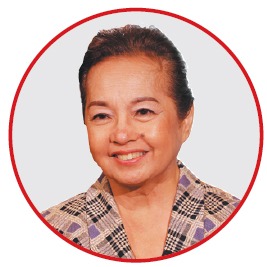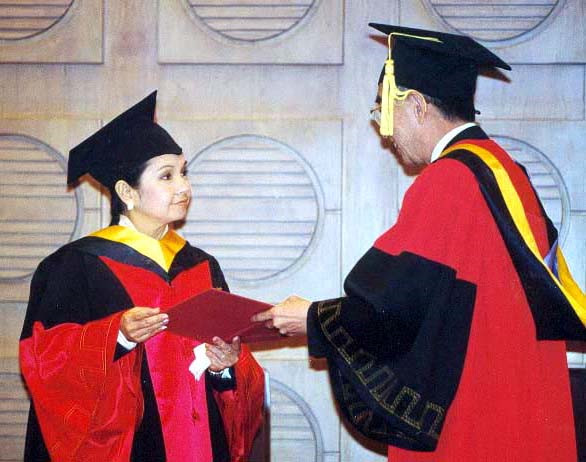
April 5, 1947, in Lubao, Pampanga province, the Philippines
In 1961, when she was 14 years old, Gloria Macapagal Arroyo's father Diosdado Macapagal was elected president of the Philippines.
In 1964, she studied for two years at Georgetown University's Walsh School of Foreign Service in Washington, where she was a classmate of future US president Bill Clinton.
She earned a bachelor's degree in economics from Assumption College in the US, graduating in 1968. She pursued a master's in economics at Ateneo de Manila University in 1978, and a PhD in economics at the University of the Philippines Diliman in 1985.
Arroyo was an economics professor from 1977 to 1987 at several universities, including the University of the Philippines and Ateneo de Manila University.
She entered politics in the 1992 election, running for senator. She was vice-president of the Philippines from 1998 to 2001, before serving as the 14th president of the Philippines between 2001 and 2010.
She is now a member of the House of Representatives representing the second district of Pampanga and was the deputy speaker of the 17th Congress from 2016 to 2017.
Arroyo was elected speaker of the House of Representatives on July 23, becoming the first woman to hold the position.
She was recognized by Asiaweek as one of Asia's most powerful women in 2001, and ranked fourth in Forbes' most powerful women list in 2005.
A Philippine view of 40 years of 'breathtaking' changes

Arroyo recalled that only basic needs were provided for at that time, which highlighted the economic progress made just a few years later. "When the great day starting in 1978 - two years after that visit - occurred, I was not surprised that China would indeed have a great speed of development after the Party congress of 1978," she said.
Forty years ago, Chinese leader Deng Xiaoping kicked off the country's reforms with his famous speech, "Emancipate the mind, seek truth from facts, and unite as one in looking to the future", which concluded that year's Central Economic Work Conference.
The speech also set the stage for the Third Plenary Session of the 11th Central Committee of the Communist Party of China, which launched reform and opening-up.
Arroyo said the policy Deng adopted in 1978 had led to great developmental changes in China that were still continuing.
When Arroyo made her first state visit to China in October 2001, after becoming Philippine president that January, she found the changes the reform and opening-up policy had brought to China since 1978 were "breathtaking".
The changes since then had also been "breathtaking", she added.
"One of the greatest accomplishments of China is that it has seen the biggest poverty alleviation in human history, because 700 million Chinese have gradually shaken off poverty since the 1970s up to today," Arroyo said.
One thing that has particularly impressed Arroyo is China's innovation-driven growth, which has pushed the development of high-speed railways, e-commerce, mobile payment and other advances.
The bicycles that she remembered being the preferred mode of transport in China in the 1970s are back, but this time backed by e-commerce innovation, with bike-sharing facilitated by mobile payment becoming popular in many Chinese cities.


